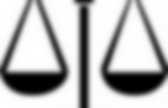

Bowman Gilfillan Africa Group. « back to competition law africa home page competition law africa competition law africa overview botswana burundi cameroon comesa egypt kenya madagascar malawi mauritius namibia nigeria rwanda seychelles south africa swaziland tanzania uganda zambia zimbabwe competition law africa country guides.
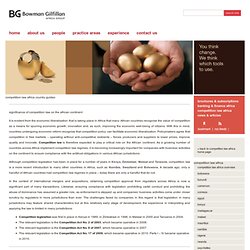
Www.un.org/en/ga/president/65/initiatives/ldcs/erik.pdf. The Global Competitiveness Index Analyzer 2011-2012. Harvard Business School - Institute for Strategy and Competitiveness. Www.oecd.org/dataoecd/20/1/2010176.pdf. Www.fordham.edu/law/faculty/patterson/antitrust/materials/PepsiCo.pdf. Www.unctad.org/en/docs/tdrbpconf10r2.en.pdf. Www.oecd.org/dataoecd/24/49/25315195.pdf. Hard Core Cartels - International Competition Law. European Commission - Competition. The EU cooperates with the US competition authorities - the Department of Justice and the Federal Trade Commission - primarily on the basis of the 1991 Cooperation Agreement and the 1998 "Positive Comity Agreement".
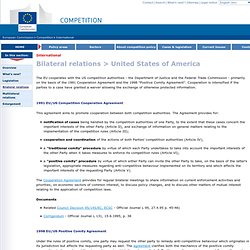
Cooperation is intensified if the parties to a case have granted a waiver allowing the exchange of otherwise protected information. 1991 EU/US Competition Cooperation Agreement This agreement aims to promote cooperation between both competition authorities. The Agreement provides for: Documents 1998 EU/US Positive Comity Agreement Administrative Arrangement on Attendance (AAA) The AAA sets forth administrative arrangements between both competition authorities concerning reciprocal attendance at certain stages of the procedures in individual cases, involving the application of their respective competition rules. The AAA is not a new agreement but an understanding about administrative arrangements to apply the 1991 Agreement. Www.oecd.org/dataoecd/60/42/21570317.pdf. Sherman Antitrust Act. It has since, more broadly, been used to oppose the combination of entities that could potentially harm competition, such as monopolies or cartels.
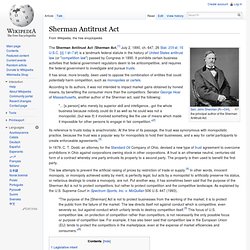
According to its authors, it was not intended to impact market gains obtained by honest means, by benefiting the consumer more than the competitors. Senator George Hoar of Massachusetts, another author of the Sherman act, said the following: "... [a person] who merely by superior skill and intelligence...got the whole business because nobody could do it as well as he could was not a monopolist.. (but was if) it involved something like the use of means which made it impossible for other persons to engage in fair competition Its reference to trusts today is anachronistic.
In 1879, C. "The purpose of the [Sherman] Act is not to protect businesses from the working of the market; it is to protect the public from the failure of the market. Legislative intent[edit] At Apex Hosiery Co. v. At Addyston Pipe and Steel Company v. Provisions[edit] Section 1: Clayton Antitrust Act. The Clayton Antitrust Act of 1914 (Pub.L. 63–212, 38 Stat. 730, enacted October 15, 1914, codified at 15 U.S.C. §§ 12–27, 29 U.S.C. §§ 52–53), was a part of United States antitrust law with the goal of adding further substance to the U.S. antitrust law regime; the Clayton Act sought to prevent anticompetitive practices in their incipiency.
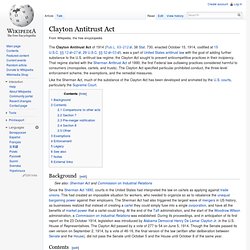
That regime started with the Sherman Antitrust Act of 1890, the first Federal law outlawing practices considered harmful to consumers (monopolies, cartels, and trusts). The Clayton Act specified particular prohibited conduct, the three-level enforcement scheme, the exemptions, and the remedial measures. Like the Sherman Act, much of the substance of the Clayton Act has been developed and animated by the U.S. courts, particularly the Supreme Court. Background[edit] Since the Sherman Act 1890, courts in the United States had interpreted the law on cartels as applying against trade unions. Contents[edit] Comparisons to other acts[edit] Section 7[edit] Simple search.